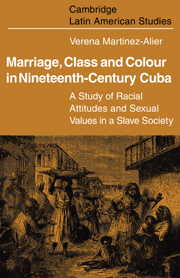Crossref Citations
This Book has been
cited by the following publications. This list is generated based on data provided by Crossref.
Martinez‐Alier, J.
1974.
Peasants and labourers in Southern Spain, Cuba, and Highland Peru.
The Journal of Peasant Studies,
Vol. 1,
Issue. 2,
p.
133.
Susan A. Soeiro
1975.
Recent Work on Latin American Women: A Review Essay.
Journal of Interamerican Studies and World Affairs,
Vol. 17,
Issue. 4,
p.
497.
Martinez‐Alier, Verena
1975.
Oppression or liberality.
Reviews in Anthropology,
Vol. 2,
Issue. 2,
p.
240.
Knaster, Meri
1976.
Women in Latin America: The State of Research, 1975.
Latin American Research Review,
Vol. 11,
Issue. 1,
p.
3.
Smith, Raymond T.
1978.
The Family and the Modern World System: Some Observations From the Caribbean.
Journal of Family History,
Vol. 3,
Issue. 4,
p.
337.
Mörner, Magnus
1978.
Recent Research on Negro Slavery and Abolition in Latin America.
Latin American Research Review,
Vol. 13,
Issue. 2,
p.
265.
Murray, Nicola
1979.
Socialism and Feminism: Women and the Cuban Revolution.
Feminist Review,
Vol. 2,
Issue. 1,
p.
57.
Murray, Nicola
1979.
Socialism and Feminism: Women and the Cuban Revolution Part two.
Feminist Review,
Vol. 3,
Issue. 1,
p.
99.
Fontaine, Pierre-Michel
1980.
Research in the Political Economy of Afro-Latin America.
Latin American Research Review,
Vol. 15,
Issue. 2,
p.
111.
Russell-Wood, A. J. R.
1982.
The Black Man in Slavery and Freedom in Colonial Brazil.
p.
1.
Gudmundson, Lowell
1984.
Black into white in nineteenth century Spanish America: Afro‐American assimilation in Argentina and Costa Rica∗.
Slavery & Abolition,
Vol. 5,
Issue. 1,
p.
34.
Andrews, George Reid
1984.
Race and the State in Colonial Brazil.
Latin American Research Review,
Vol. 19,
Issue. 3,
p.
203.
Kuznesof, Elizabeth
and
Oppenheimer, Robert
1985.
The Family and Society in Nineteenth-Century Latin America: an Historiographical Introduction.
Journal of Family History,
Vol. 10,
Issue. 3,
p.
215.
Stern, Steve J.
1985.
Latin America's Colonial History.
Latin American Perspectives,
Vol. 12,
Issue. 1,
p.
3.
STOLER, ANN
1985.
perceptions of protest: defining the dangerous in colonial Sumatra.
American Ethnologist,
Vol. 12,
Issue. 4,
p.
642.
Gutiérrez, Ramón A.
1985.
Honor Ideology, Marriage Negotiation, and Class-Gender Domination in New Mexico, 1690-1846.
Latin American Perspectives,
Vol. 12,
Issue. 1,
p.
81.
McCreery, David
1986.
‘This Life of Misery and Shame’: Female Prostitution in Guatemala City, 1880–1920.
Journal of Latin American Studies,
Vol. 18,
Issue. 2,
p.
333.
Martin, Emily
1989.
The cultural construction of gendered bodies: Biology and metaphors of production and destruction*.
Ethnos,
Vol. 54,
Issue. 3-4,
p.
143.
Stoler, Ann Laura
1989.
Rethinking Colonial Categories: European Communities and the Boundaries of Rule.
Comparative Studies in Society and History,
Vol. 31,
Issue. 1,
p.
134.
STOLER, ANN L.
1989.
making empire respectable: the politics of race and sexual morality in 20th‐century colonial cultures.
American Ethnologist,
Vol. 16,
Issue. 4,
p.
634.



